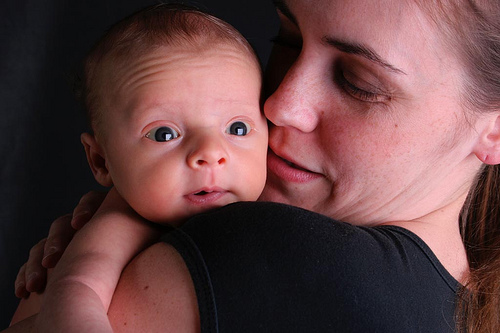Sometimes, Baby Just Has To Cry
/Sometimes, Baby Just Has To Cry
Babies are a conundrum. I’m just going to open with that, because if you’re searching at 3am for the cure for a baby who just won’t stop crying, that’s the first thing that you need to know. Babies are not easy to figure out, despite all the years of amazing parenting that you did before you even had a baby. You’d assume that babies were simple creatures: feed, burp, sleep, repeat. Chuck in a few clean diapers and a warm blanket, and you’ve got a contented baby, right? Unfortunately, there is so much more to having a baby than just keeping them fed and warm. While those are the very basics, babies are complex. There are very few absolutes when it comes to babies, but there’s one thing that every baby all over the world has in common. All babies cry.
How much a baby will cry is more unique, as babies all cry for different reasons and some babies will cry more than other babies. Most new mothers can expect their baby to cry for up to three hours in any given day, and it doesn’t have to all be in one go, either. Babies have no other way to communicate with us, except to open their mouths and yell when they want something from us. Sometimes, that yelling you’re listening to, and those cries can get too much for parents, and it’s frustrating not to know what a baby wants. Technology hasn’t developed the baby version of Google Translate, but it has developed more comprehensive seats for babies to use to help to soothe them. You can check out baby seat comparisons by going online, and that’s one thing that technology has done to help mother’s everywhere! Trying to decipher whether your baby wants movement, or a feed isn’t easy, but if you have a baby wailing in your lap, the chances are that something is amiss. Understanding all the cues from your baby telling you that something is seriously wrong is important, and we’ve put together some of those reasons for you. It may be 3am and you may be tearing your hair out, so hopefully some of these can help you narrow it down.
Credit: Pixabay
Baby Wants… Feeding
A hungry baby is usually a desperate one. Some can go from 0-60 with their mood; one moment being calm and laying down and the next, screaming as if they’ve never eaten before in their lives. The cry from a baby who wants to eat is often accompanied by a ‘nyeh’ sound, and you can learn about the sounds of cries from this website. Babies are extremely smart, and when they cry hungrily the sound is very distinctive because of where his tongue sits in his mouth. Crying is actually the latest stage of hunger, believe it or not. Babies have cues before they get too agitated and ‘hangry’, which include arms and legs moving quickly, smacking their lips, sucking on fingers and rooting for the breast or bottle. If you aren’t responding to these cues, grab the earplugs; a hungry baby is a loud one!
Credit: WikiMedia Commons
Baby Wants… Sleep
As an adult, you know the drill when you’re tired. You head to bed, lay down in the blankets and you close your eyes and wait for sleep to come. A baby doesn’t have the ability to do any of that, and they often need a parent to help them drift off. Sleep is, in fact, a skill that is learned just like anything else. A baby who is crying is unable to self-soothe, as the crying raises their stress level and makes them cry more. It’s a vicious circle, really. It’s why all the guidelines tell you not to try and install self-soothing until at least six months old. Before that age, babies are just too small to understand that sleeping alone is a good thing, and they need the comfort of a parent to help them to get there. It’s for this reason that sleep solutions like ‘cry it out’ are strongly advised against. Every baby is different; some babies like to be put down with a parent in their eye line so that they feel secure and calm enough to drift off. Others like to be swaddled and held until they fall asleep. The method you choose to put your baby to sleep is going to vary compared to other babies, so you need to try different things until you find what works for you. A baby waking through the night is normal, so try not to spend their early weeks trying to get them to sleep through: they’re not supposed to yet!
Credit: U.S. Air Force photo by Senior Airman Rusty Frank
Baby Wants… Wiping
You’ve probably seen other mothers lift and sniff their baby’s butt and thought it was gross. Then you had your own baby and lifting your baby to smell their undershorts is as normal as the morning coffee that you drink. Unfortunately for us, we get to clean diapers on a very regular basis. When all is failing, and you can’t work out why your baby is crying, changing their diaper is right up there in the top five things to do to soothe your baby. Some babies can’t stand to sit in a wet diaper for long (I can’t blame them, really) and so you should look out for needing a change. Some diapers come with wetness indicators so that you can see how far gone the diaper is before you need to change it. Never let your baby sit in a dirty diaper, though. The diaper rash just isn’t worth it for either of you to deal with.
Credit: MakeLessNoise
Baby Wants… Winding
As an adult, your body is capable of bringing up wind on its own and relieving you of any discomfort. A baby doesn’t have this ability, and so after a feed will need you to wind him. When a baby is feeding, using a pacifier or crying, they are swallowing air. Burping the baby is an essential to their comfort, and there are several different ways that you can burp your baby. If you are bottle feeding, aim to burp after every two to three ounces, even if it means you pry the bottle out of their mouth. The alternative is to hope that when you do eventually sit him up, he doesn’t vomit all over you because a bubble of wind was trapped under the feed!
Credit: Pixabay
Baby Wants… Solace
Even the smallest of babies can be ‘touched out’. Overstimulation is a very real thing, and it’s usually a result of the fact that he’s, well, a baby. The world is a very big and very noisy place for their little ears and bodies and being passed around family during a visit and being brought to a loud place can overstimulate their senses. Smaller groups of visitors and moderate noise where possible is important for your baby. When you’ve done everything else to stop him crying, try and just lay him down with you in his line of sight. You could be surprised by a baby who calms instantly.
Credit: Pixabay
Baby Wants… Teeth
Teething in babies can start as early as three months old, which means your little darling who can’t communicate the basics of human need is suddenly suffering because his gums are giving him a hard time. Excessive drooling caused by teething can cause a rash on the cheeks, and his diapers can be quite horrendous if he is teething. Using teething gels or granules, teething toys and even giving your baby a massage around their gums can help. Stay away from the whisky on the gums that your parents or grandparents swore by: it’s rather frowned upon to essentially drug the baby these days.
Credit: Pixabay
Baby Wants… Nothing
Sometimes, just sometimes, baby just has to cry. It’s a truth that every parent knows deep down, but none want to admit to. A mother can tear her hair out searching for the reason why their baby is crying, but there just isn’t a reason here. You could try many potions and ‘cures’ for colic. You could go dairy free in your diet if you are breastfeeding, or you can switch to thicker milk if you are formula feeding. None of that will matter though, if your baby just has to cry. Colic is a bad word in the parenting community, because it essentially means that your baby is screaming but is in no pain and isn’t uncomfortable, they just cry. Three hours a day for more than three days a week is the norm for a baby with colic, although it won’t be the norm for your ears. The important thing to remember is that you haven’t done anything wrong, and there’s nothing that you can actually do to stop it. Colic doesn’t normally last beyond three months, and yet it can feel like the longest three months of your life.
You are holding onto a little piece of your own mortality, and even though the early baby days are stressful and trying, do your best to hang on and make it through and marvel at it. They’re only tiny once.
**This is a collaborative post.**


























